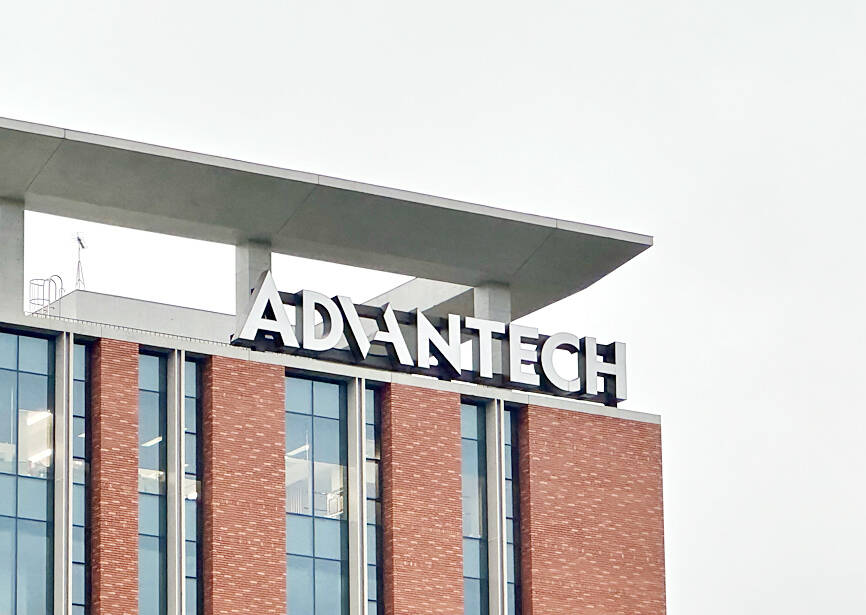Leading industrial PC maker Advantech Co (研華) plans to acquire Aures Technologies SA, a French company known for its point-of-sale (POS) and kiosk equipment, to expand its global coverage in smart retail products and services.
Advantech proposed to acquire 3.938 million Aures shares from the French firm’s major shareholder and through a public tender offer at up to 6.7 euros per share, the PC maker said in a statement after announcing the deal at the Taiwan Stock Exchange late on Friday.
The company aims to acquire up to 100 percent equity of Aures, a well-known brand in the western market with a strong presence for its POS equipment in Europe, Australia and the US, the statement said.

Photo: Fang Wei-chieh, Taipei Times
Advantech also plans to subscribe newly issued convertible bonds from Aures, totaling 5 million euros (US$5.35 million), to support its working capital, it added.
The companies expect to close the transaction following the completion of internal approval processes by both parties and regulatory approval from relevant authorities, the statement said.
The deal comes as the global retail industry has gone through significant challenges in the past few years due to the COVID-19 pandemic, supply chain disruptions, global inflation and interest rate hikes. At the same time, the rise of artificial intelligence and shifts in consumer behavior have spurred industry transformation and consolidation trends.
It has identified smart retail as a sector with significant potential and believes the deal would create greater synergy, as the two firms complement each other in terms of regional coverage, product portfolio and organizational capabilities, said Advantech, the first regional industrial PC vendor dedicated to smart cities and the Internet of Things (IoT).
Following the acquisition, Aures would maintain its independent operations, while Advantech assists in optimizing its management system, creating synergies through product roadmap integration, technical support and cross-selling initiatives, the statement said.
Advantech on Friday also reported net profit of NT$1.99 billion (US$61.1 million) for the January-to-March quarter, which was down 32.7 percent from a year earlier and 13 percent lower than the previous quarter.
Earnings per share were NT$2.32 in the quarter, the lowest since the second quarter of 2021, when it was NT$2.31 per share, while gross and operating margins declined to 40 percent and 13.8 percent respectively.
First-quarter revenue was NT$13.88 billion, down 20.21 percent year-on-year and 8.31 percent quarter-on-quarter, as the company’s business units — comprising embedded IoT, industrial cloud and video, applied computing, industrial IoT and service IoT — all underperformed with double-digit percentage declines.
By region, sales in Taiwan in the quarter outperformed other markets, with annual growth of 9 percent and shipments to China posted only a single-digit percentage fall on the back of transportation and semiconductor equipment-related projects, the company said.
However, sales to North America, Europe, North Asia and emerging markets registered double-digit percentage declines on an annual basis due to weak demand, it said.
Advantech said challenges of overall economy and regional markets remain severe for this quarter and customers are still conservative about placing new orders.
However, the anticipated acceleration of global manufacturing automation, smart energy and infrastructure upgrades is expected to further drive the company’s related new project shipments in the second half of the year, it said.

Intel Corp chief executive officer Lip-Bu Tan (陳立武) is expected to meet with Taiwanese suppliers next month in conjunction with the opening of the Computex Taipei trade show, supply chain sources said on Monday. The visit, the first for Tan to Taiwan since assuming his new post last month, would be aimed at enhancing Intel’s ties with suppliers in Taiwan as he attempts to help turn around the struggling US chipmaker, the sources said. Tan is to hold a banquet to celebrate Intel’s 40-year presence in Taiwan before Computex opens on May 20 and invite dozens of Taiwanese suppliers to exchange views

Application-specific integrated circuit designer Faraday Technology Corp (智原) yesterday said that although revenue this quarter would decline 30 percent from last quarter, it retained its full-year forecast of revenue growth of 100 percent. The company attributed the quarterly drop to a slowdown in customers’ production of chips using Faraday’s advanced packaging technology. The company is still confident about its revenue growth this year, given its strong “design-win” — or the projects it won to help customers design their chips, Faraday president Steve Wang (王國雍) told an online earnings conference. “The design-win this year is better than we expected. We believe we will win

Chizuko Kimura has become the first female sushi chef in the world to win a Michelin star, fulfilling a promise she made to her dying husband to continue his legacy. The 54-year-old Japanese chef regained the Michelin star her late husband, Shunei Kimura, won three years ago for their Sushi Shunei restaurant in Paris. For Shunei Kimura, the star was a dream come true. However, the joy was short-lived. He died from cancer just three months later in June 2022. He was 65. The following year, the restaurant in the heart of Montmartre lost its star rating. Chizuko Kimura insisted that the new star is still down

While China’s leaders use their economic and political might to fight US President Donald Trump’s trade war “to the end,” its army of social media soldiers are embarking on a more humorous campaign online. Trump’s tariff blitz has seen Washington and Beijing impose eye-watering duties on imports from the other, fanning a standoff between the economic superpowers that has sparked global recession fears and sent markets into a tailspin. Trump says his policy is a response to years of being “ripped off” by other countries and aims to bring manufacturing to the US, forcing companies to employ US workers. However, China’s online warriors